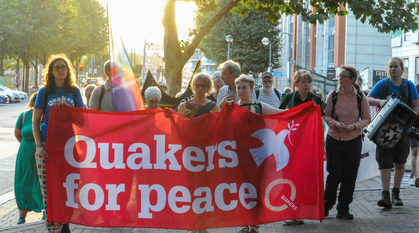Why are Quakers involved in Churches Together?
After a challenging few years for Quaker engagement, Judith Baker explores why Quakers continue to be part of ecumenical bodies.

Sometimes it can be tough to be the Quaker rep at a local 'Churches Together' group. Sometimes headlines at national or international level concerning other churches cause some Friends to ask why we bother.
Belonging through difference
Churches Together in Britain and Ireland (CTBI) is the successor organisation of the British Council of Churches, of which Quakers were founder members. Believing that love is the foundation of our faith, and that reaching out to others and living with diversity is part of being loving, it seems to me that we have to continue to belong even when theological differences are large. We do not pretend that the differences are not there.
Equally we know that we too have much to learn from other churches. We can be reminded of parts of our Christian heritage which can enrich our spiritual lives today and hear about the life of other churches which are flourishing where ours is struggling. 'Receptive ecumenism' means each tradition asks what it can learn from others in the ecumenical family.
Ecumenical bodies
Please don't let the funny words put you off! Ecumenical means cooperation among churches, from the Greek for the whole world. 'Ecumenical instruments' means the different ecumenical groups of churches in these islands.
Cytûn is the organisation for Churches Together in Wales, with Welsh Friends playing an active part. Action of Churches Together in Scotland (ACTS) is undergoing a change of organisation and name, probably to be called the Scottish Christian Forum. General Meeting for Scotland are active members.
Churches Together in England (CTE) is one of the most diverse groupings of churches in any country in the world. There are 52 different churches committed to working together. It seems some Friends equate CTE with the C of E – but that is far from the case; the Church of England is just one of the member churches. CTE also has 60 bodies in association, such as Action by Christians Against Torture, Christians against Poverty, the Fellowship of Reconciliation, the Quiet Garden Movement, and the Student Christian Movement.
Friends are active at local CTE level and at the national level where a Quaker is the current chair of the board of trustees. The Clerk of the Quaker Committee for Christian and Interfaith Relations (QCCIR) represents Friends on the executive decision-making body and I, as a staff member, regularly meet with other national ecumenical officers. Volunteers appointed by QCCIR represent Friends on various sub-groups of CTE and CTBI.
The Religious Society of Friends (Quakers) is a traditional peace church, along with the Brethren and the Mennonites. Friends have long believed that Jesus calls us to work to bring about peace. Reconciliation between churches is also about peace, how could we not be involved?
Journeying together
I've found it quite humbling to be the recipient of all sorts of nice things said about Quakers when I meet with the ecumenical representatives from other churches. This includes enthusiastic examples of Quakers involved at local level. People have also expressed to me their real sorrow at the decision taken to ask the 4th presidency group of CTE not to enact the presidency of Hannah Brock Womack, the Quaker President-Elect, because she is married to a woman. That decision, which seems hardly in the spirit of ecumenism, has been a low point for us in this ecumenical body.
However, out of a terrible standoff some positive steps have been taken. This conflict around recognition of equal marriage has led other churches to examine their own pastoral care for their LGBTQ+ members. The 4th presidency group of churches has been steadfast in its support of Hannah and her graciousness has impressed all who come across her, including the other five presidents.
There is disagreement amongst the churches on so much, but ecumenism is about journeying together, not about uniting in all aspects of theological argument. Churches have different views about the ordination of women, baptism, recognising each other's ordained ministers and the Eucharist. It is not as if Quakers are the only church which takes a different position from others on an issue.
Strengthening faith-led work
It is hard to work alone, as a small church, on all the issues of injustice in the world. Being members of organisations with other churches strengthens the movements. For example, Quakers administer the Ecumenical Accompaniment Programme in Palestine and Israel (EAPPI) on behalf of Churches Together in Britain and Ireland, with representatives from other churches participating in the committee, and volunteers coming from many different churches and faiths.
Quaker work to build on our commitment to becoming an actively anti-racist faith community is strengthened by working together through the Racial Justice Advocacy Forum of CTBI and the Racial Justice Working Group of CTE. We have recently begun exploring working with other churches in an Ecumenical Roundtable on European Church Legacies of Slavery and Colonisation. Being part of ecumenical bodies pushes us further on anti-racist work.
Locally, Churches Together groups run foodbanks, night shelters and provide street pastors. They work together on homelessness, poverty, climate justice, prisons and debt support. Quakers can get involved in this work, doing much more than we could alone.
QCCIR provides support and resources for local ecumenical or interfaith work. Quakers and the Ecumenical Agenda (PDF) is a good starting point. Other helpful resources are available from QCCIR.


